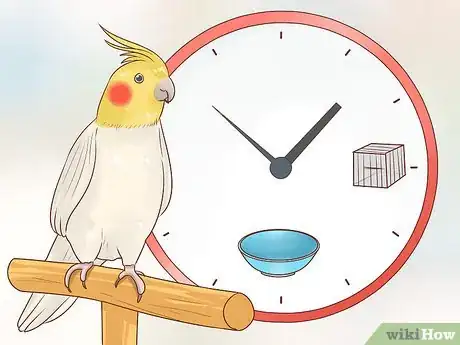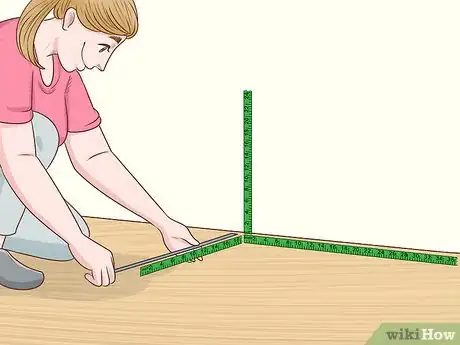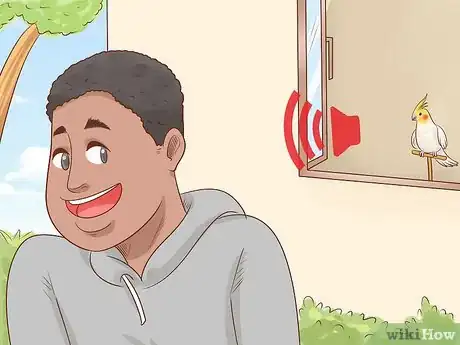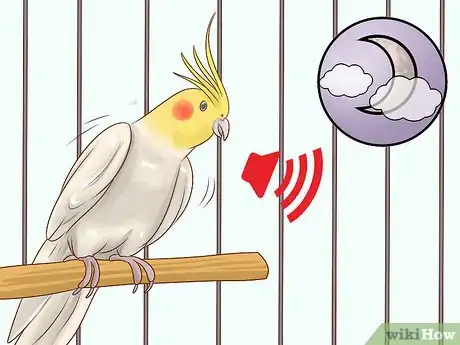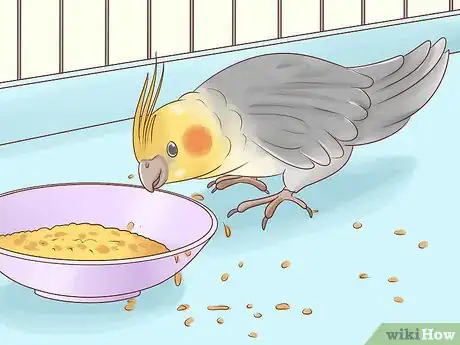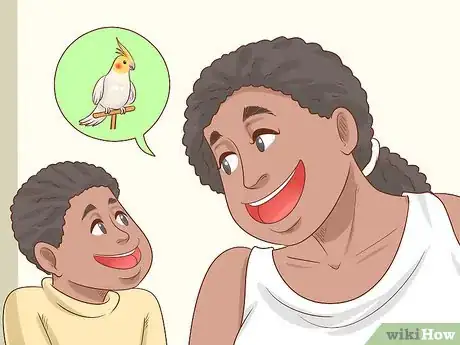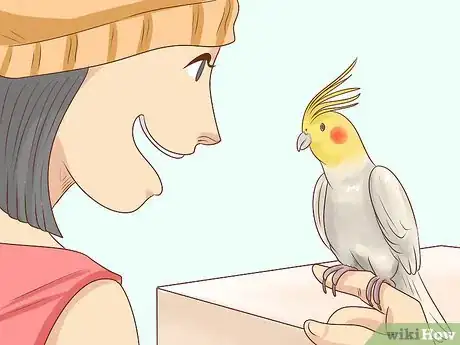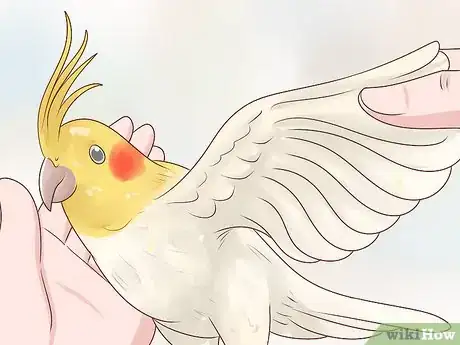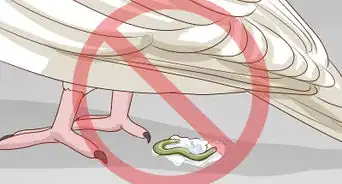This article was co-authored by Melissa Nelson, DVM, PhD. Dr. Nelson is a Veterinarian who specializes in Companion and Large Animal Medicine in Minnesota, where she has over 18 years of experience as a veterinarian in a rural clinic. She received her Doctor of Veterinary Medicine from the University of Minnesota in 1998.
There are 15 references cited in this article, which can be found at the bottom of the page.
wikiHow marks an article as reader-approved once it receives enough positive feedback. In this case, 95% of readers who voted found the article helpful, earning it our reader-approved status.
This article has been viewed 24,946 times.
Cockatiels are a small variety of parrot with plenty of personality. These social birds make great pets for first-time bird owners, but they are not for everyone. Before deciding to get a cockatiel, carefully consider your home and lifestyle to make sure it is right for a bird. Cockatiels also have some special habits that you should understand before purchasing. If you do make the decision to get one, find a social, alert, and healthy bird who will be your special friend for years to come.
Steps
Evaluating Your Lifestyle
-
1Determine how much time you can put into daily care. Cockatiels do not need as much upkeep as other pets, but they are very social. Be aware of the daily needs of a cockatiel so you can understand how they will fit into your life.
- The cockatiel will need food and fresh water at least once a day.
- You will need to clean the food and water bowl at least once a day. You will need to wash and disinfect the cage at least once a week.
- Cockatiels need at least an hour of free flight around your home a day. You should be able to supervise them during these exercise periods.
- You may need to have two or three ten minute training sessions a day to help tame your cockatiel.[1]
-
2Calculate your budget. Caring for an exotic bird like a cockatiel can get pricy. Before you buy a cockatiel, make sure that you afford a cage, toys, food, and veterinary care.[2]Advertisement
-
3Inspect your living space to see if it is large enough. Cockatiels like plenty of room to roam. They will need a large metal cage that is at least 36 inches (91 cm) long, 18 inches (46 cm) wide, and 24 inches (61 cm) high. Before you buy a cockatiel, measure a space in your home where you can put this cage.
- Cockatiels are very social, so you should find an area where there is plenty of activity. For example, a living room is a great place to put the cage.[5]
- Make sure you have a space for the cage that isn’t in or too close to your kitchen. Fumes from certain non-stick pans can make cockatiels sick or even kill them.
- Cockatiels like to spend time outside of the cage. When they roam around your home, make sure that windows are shut, ceiling fans are turned off, and electrical wires are not exposed.[6]
- Do not get a wooden cage because the cockatiel may chew the bars.
-
4Consider the noise level. Cockatiels are generally quiet birds, but they still like to sing and talk. If you are out of the room, the cockatiel may try to loudly call to you. If you prefer a quiet home, a cockatiel may not be the right pet for you.[7]
- While cockatiels can learn to talk, most will prefer to whistle instead. If you want a talking bird, look into a different type of parrot.
- Male cockatiels tend to be louder than female cockatiels.[8]
Identifying Cockatiels' Unique Characteristics
-
1Determine if you can commit to twenty years of ownership. The average lifespan of a cockatiel is around fifteen to twenty-five years. If you are unsure about caring for a bird for that long, you may want to choose a shorter lived variety of bird.[9]
-
2Learn to live with a cockatiel’s picky eating habits. Cockatiels need a varied diet that includes pellets, vegetables like carrots, leafy greens such as dandelion leaves and watercress, and fruit such as apples and bananas. Cockatiels are known as picky eaters, so you may spend some time finding the perfect diet for them.
- If you do decide to get a cockatiel, try to feed them the same diet as they had at the store or breeder for the first few weeks. This will help them adjust to their new home.[10]
-
3Think about whether you can deal with night frights. Cockatiels tend to get night frights. These are episodes where the bird is startled awake at night. The cockatiel may panic by thrashing against the bars of the cage or screaming. Carefully consider if this will bother you at night.
- Usually, night frights are caused by another animal or person walking around the home. Creating a still and calm environment at night can reduce night frights.
-
4Recognize that cockatiels are messy birds. Like all parrots, cockatiels can create a mess when they eat. You may find food scattered over their cage, in their water bowl, and outside of their cage. Regular cleaning will help, but if you’re looking for a tidy pet, a cockatiel may not be the right choice.
- You can buy a cage skirt to help clean up any feed or seed that has fallen out of the cage. Simply wrap up the skirt, and dump out the food in the trash.
- Cockatiels love to chew. You will need to make sure that they have plenty of chew toys so that they do not destroy items in your home.[11]
-
5Consider what your family wants. If you live with other people, consider their needs as well. Make sure that others in your household are as thrilled about owning a cockatiel as you are.[12]
- Cockatiels are good with children. Just make sure to show children how to approach the bird, how to hold them on their finger, and when to leave the bird alone.
- Cockatiels may make great pets for households with dog or cat allergies.
Choosing the Right Cockatiel
-
1Ask if the bird is weaned. Some pet stores sell young birds that do not eat adult food yet. This can be a problem. An unweaned bird may beg you for food, and you may have to hand-feed them for several weeks. Before purchasing a bird, make sure that it has been fully weaned.[13]
- If you’re uncertain, you can put a deposit on the bird, and ask to return in two or three weeks to pick it up. If the bird is still healthy, you can take them home.
-
2Handle the bird to learn if they are social. Cockatiels are typically very social birds. Before buying, ask to hold the cockatiel. While any bird can bite if they are surprised, an ideal cockatiel should not be afraid of you. Give the bird a few minutes to get used to you before you make any judgments.[14]
- Hold out a finger, and see if the bird hops onto it. If so, they have already been tamed.
- Even if they do not hop onto your finger right away, a social cockatiel will probably come up to you when you approach the cage.
- If the bird hisses, backs away, or hides from you, they may have a bad temperament.
-
3Examine their body to determine if they are healthy. A healthy cockatiel will have clear open eyes and smooth clean feathers. They should be alert and energetic. Give the bird a quick inspection to make sure they are generally healthy.[15]
- The feathers over the body should lie flat. If the feathers are ruffled or patchy, the bird may be stressed or ill.
- If the cockatiel is sitting with the feathers puffed up and the eyes half-closed, it may mean that the bird is sick.
- Check the beak to make sure that there are no cracks, flakes, or crookedness.
- Lift up the bird, and examine their underside. If it is wet or dirty, it may mean that the bird has diarrhea.
-
4Take the bird to an avian vet. Within three days of purchase, you should take your cockatiel to an avian vet for a full health exam. Birds don’t always show signs of sickness, so this visit will be important in identifying if there are any problems.[16]
- An avian veterinarian is a vet that specializes in birds. You can look up a local avian vet at the Association of Avian Vet’s website.
- Ask the person who’s selling the cockatiel for a health guarantee before you buy the bird. This means that you can return your cockatiel for another or get your money back if you bring it to an avian vet within a certain number of days (usually 7) and find that it’s ill.
Warnings
- If one bird is sick in a pet store, the other birds are likely sick as well. Diseases pass very quickly between birds.⧼thumbs_response⧽
References
- ↑ http://www.cockatiel.com/trainingtips.html
- ↑ http://www.petyak.com/birds/general-bird/articles/cost-of-owning-a-bird/
- ↑ http://www.peteducation.com/article.cfm?c=15+1794&aid=1516
- ↑ http://www.mit.edu/~rei/Tiels.html
- ↑ https://pijac.org/sites/default/files/pdfs/cockatiel_new.pdf
- ↑ https://www.beautyofbirds.com/birdproofingyourhome.html
- ↑ https://www.beautyofbirds.com/cockatielsaspets.html
- ↑ http://www.cockatiel.com/tiel101.html
- ↑ https://www.beautyofbirds.com/cockatielsaspets.html
- ↑ http://www.cockatiel.com/noteating.html
- ↑ https://vcahospitals.com/know-your-pet/cockatiels-general
- ↑ http://www.vetstreet.com/our-pet-experts/5-things-you-dont-know-about-cockatiels
- ↑ https://books.google.com/books?id=tvYKBgAAQBAJ&lpg=PA36&dq=cockatiel%20health&pg=PA37#v=onepage&q&f=false
- ↑ https://books.google.com/books?id=tvYKBgAAQBAJ&lpg=PA36&dq=cockatiel%20health&pg=PA40#v=onepage&q&f=false
- ↑ https://books.google.com/books?id=tvYKBgAAQBAJ&lpg=PA36&dq=cockatiel%20health&pg=PA36#v=onepage&q&f=false
- ↑ http://www.aav.org/?page=healthexam
About This Article
To know if a cockatiel is right for you, first make sure that you’ll have enough time to spend on its daily care, such as feeding it, cleaning its cage, and giving it at least an hour of free flight per day. Additionally, measure your living area to ensure you have enough space for its cage, which should be at least 18 inches wide and 24 inches high. Besides evaluating your lifestyle, you should think about whether or not you’re prepared to commit to 20 years of pet ownership, which is how long cockatiels live on average. You should also keep in mind that cockatiels are quiet birds and prefer whistling over talking, so if you want a bird that talks a lot, consider getting a different type. To learn how to choose a healthy and social cockatiel, read more from our Veterinary co-author!
